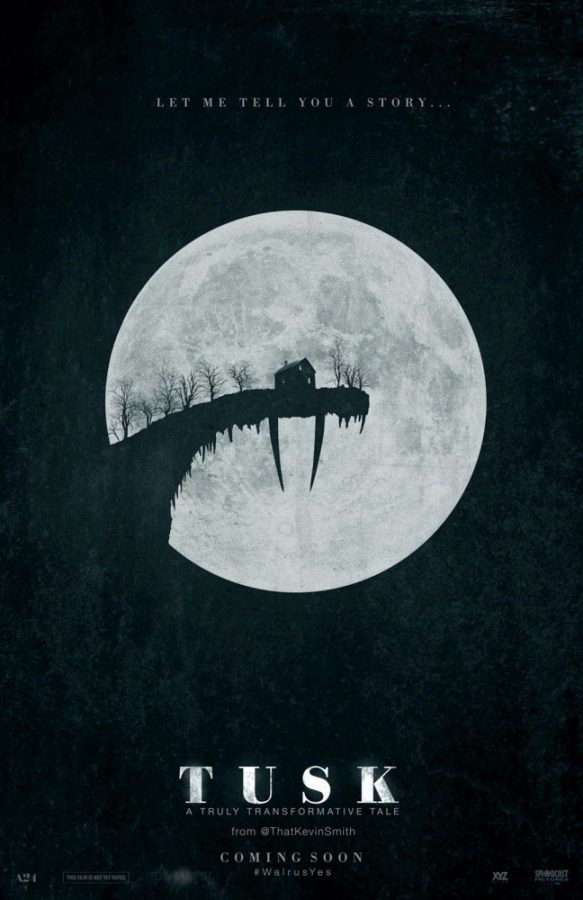There’s a question that’s plagued mankind from the beginning of time: Is man, indeed, a walrus at heart? In one of the most bizarre movies you’re liable to see this year, “Tusk” answers this question to lukewarm effect.
The distinctively mustachioed Wallace (Justin Long) runs a popular podcast, “The Not-See Party,” with his partner Teddy (Haley Joel Osment). Yes, “not-see” is pronounced just as you think, and yes, the movie milks that gag bone dry. Also, if you haven’t kept up with Osment since his “The Sixth Sense” days, you might be surprised that his face looks exactly the same as it did 15 years ago.
For the podcast, Wallace finds stories and people that are off the beaten path and exploitatively relays them to Teddy and his listeners. His subjects are his fodder.
That’s not the only place where Wallace’s charm wears thin. His stunning girlfriend, Ally (Génesis Rodríguez), is fed up with his callous, egocentric behavior, a result of his podcast’s booming success.
This conflict feels extraneous and gives rise to an unnecessary love triangle between Wallace, Ally and Teddy.
For his next podcast installment, Wallace ventures up to the Great White North of Canada, and through a serendipitous occurrence, finds himself in the mansion of Howard Howe (Michael Parks). Howe is an eccentric recluse with stories aplenty to tell Wallace, who is absolutely enraptured with the old man’s tales.
Wallace is not the only one to be mesmerized by Howe. Parks delivers a performance that captivates the audience. Parks’ Howe waxes and wanes poetry, quoting literature with his reedy voice. His stories of his life of adventure reel us in until the mad man beneath is revealed. Wallace and the viewer believe he’s harmless, until it’s much too late.
You see, one story of Howe’s is of particular note. While shipwrecked, he was rescued and cared for by a walrus that he affectionately named Mr. Tusk. Ever since that fateful occurrence, Howe has deemed the company of walruses superior to that of humans, and has been trying to find the answer to one question his entire life: “Is man, indeed, a walrus at heart?”
This nutty revelation, said with the utmost sincerity from Parks, perhaps elicited the biggest laugh of the film. At the drop of a hat, Parks turns Howe from benevolent, elderly man to a sinister, cackling mad man. Howe’s endgame is to transform Wallace into his beloved Mr. Tusk. It’s like how in Alfred Hitchcock’s classic “Vertigo,” James Stewart’s character wants to transform Kim Novak’s character into the image of his dearly departed — except with more blubber and tusks.
This film follows through with this concept to its full extent. If you’re wondering whether the crazed scientist Howe is successful in turning Wallace into a Frankenwalrus, you won’t be disappointed.
However, it’s not all bonkers body horror. Screenwriter and director Kevin Smith (“Clerks”) enjoys drawing out stories. In fact, the film’s tagline is, “Let me tell you a story.” Smith employs long takes quite a bit, allowing his actors to play out lengthy, uninterrupted monologues. This works well with Parks as Howe but not so much with other characters.
The main culprit is the bumbling detective Guy Lapointe (Johnny Depp), who’s introduced in the latter half of the film. Lapointe can’t get to the point in any sane amount of time. He speaks slowly, repeats himself and goes off on tangents. That’s where the humor lies, but it wears thin quickly.
Lapointe may be representative of the film’s worst aspect: Smith wants to explore the storytelling process, but the film dwells on yarns that aren’t as interesting as things off-screen. Of course, what can possibly be more interesting than a man being turned into a walrus?
The hashtag that’s been used to promote “Tusk” has been #WalrusYes. I won’t go so far as to say #WalrusYes, but I will give it a #WalrusAllRight.
Grade: C
_______________
Follow Alex Guyton on Twitter @GuyTonAlexAnder









